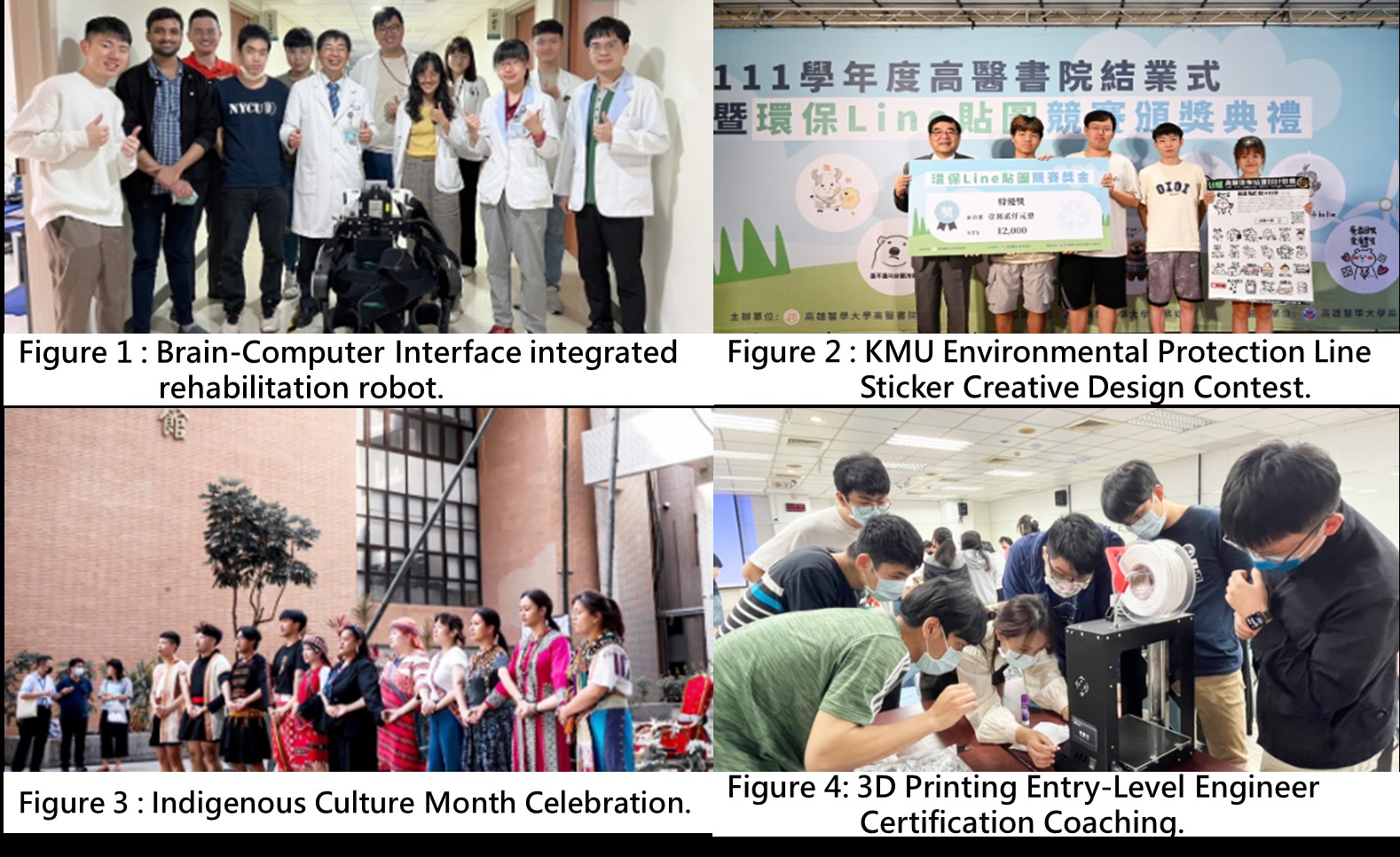KMU’s Higher Education Sprout Project (year 112) is dedicated to cultivating "Smart Health Care of sustainable Talent in the Post-pandemic Era." This initiative integrates four key elements: human-centered care, cross-domain innovation, smart health, and social action. The achievements and highlights are summarized as follows:
A. Teaching Innovation and Enhancement
1. Obtaining most cases ratified by Teaching Practice Research Program among private universities, and having three teachers win National Education Honors: Over the past five years, KMU has obtained 141 MOE Teaching Practice Research Programs, achieving the highest number among private medical universities with an approval rate of approximately 60%. Additionally, in the past three years, three KMU teachers have been honored with the MOE National Excellent Teacher Awards.
2. Overall integrating programming design courses, and launched three micro courses in artificial intelligence to cultivate cross disciplinary digital talents: Through the Information capability assessments, students were guided to study Python(I) or (II) according to their skill level, with the completion rates have increased from 33% to 81.62%. In addition, three micro-programs, including “AI for Healthcare” and “Transdisciplinary Care for Dysphagia,” have been introduced, with a total of 211 students completing these courses.
3. College education focusing “Health Promotion and Professional Practice”, utilizing smart technology to transform medical education: Integrating AR, VR, and AI technologies, anatomy teaching incorporates 3D Slicer with VR and introduces hands-on medical 3D printing training. The Digital Dentistry Education Center has also been expanded to enhance digital clinical education. Additionally, the College of Health Science has adopted medical 3D printing training, supporting one project to participate in a national university entrepreneurship simulation learning platform and guiding 12 students to take the iPAS certification exam for the Junior 3D Printing Additive Manufacturing Engineer Qualification.
B. Reinforcing University Social Responsibility
1. Reinforcing social responsibility by creating resilient campus and multifaceted impact: By integrating United Nations Sustainable Development Goals (SDGs) into KMU Academy of Life education, we have enhanced students' awareness and understanding of the SDGs. Smart facilities, including smart intelligence blackboards and unmanned library kiosks, have been implemented to improve digital services, successfully reducing the restoration time of digital equipment to within 8 hours. These advancements contribute to energy efficiency and disaster prevention capabilities. Additionally, we achieved a deregistration rate of 70.54% for unneeded library books (3,148 out of 4,463 volumes) and donated usable IT equipment to 14 disadvantaged students from our institution and 3 students from Boai Elementary School. In terms of energy conservation, our electricity savings rate reached 2.03%, and green procurement expenditures totaled NT$6,264,303. We also focused on 40 local neighborhoods, promoting initiatives such as health enhancement programs and music therapy services. Since 2021, we have published the University Social Responsibility Report annually, and for two consecutive years, we have been honored with the "Taiwan Sustainability Award – Sustainability Report Category."
C. University-industry Cooperation and Bonding
1. Establishing an integrated internship system and enhancing the quality assurance mechanism for student internships: From academic years 109 to 111, a total of 3,952 students from 20 departments participated in industry internships. Each department developed satisfaction surveys, and the results were analyzed and fed back to the Internship Committee for review and improvement, ensuring the quality of internships. Furthermore, 87.87% of graduates from the medical and health fields reported that their professional skills align with the demands of their current jobs, highlighting the remarkable impact of internships on career development.
2. Establishing core technology service platforms to collaboratively address industry challenges: By integrating the technical resources of the College of Medicine, College of Pharmacy, Regenerative Medicine and Cell Therapy Research Center, New Drug Development and Value Creation Research Center, and Tropical Medicine and Infectious Disease Research Center, nine service platforms have been established. These platforms aim to translate research outcomes into industrial applications while fostering students' practical experience and professional skills.
D. Promoting Publicity of Higher Education
1. Fulfill diverse educational support, leading learning performance to steadily increased: The school has achieved a 100% outreach rate in providing care and support for economically or culturally disadvantaged students. Through personalized academic counseling, the national examination passing rate has increased from 70% in 2017 to 85.96% in 2023. Additionally, we collaborated with various departments to implement "course-enhancement teaching tutorials" and provided academic scholarships to support disadvantaged students. Between 2018 and 2023, the academic performance of disadvantaged students who participated in on-campus learning support programs surpassed those who did not. This demonstrates that comprehensive academic assistance plays a significant role in stabilizing and improving students' learning outcomes.
2. Outstanding Performance in THE University Impact Rankings, SDG 3 “Good Health and Well-Being” Earns International Recognition: In the 2023 THE World University Impact Rankings, Kaohsiung Medical University ranked among the global top 20 and second nationwide for SDG 3 “Good Health and Well-Being,” showcasing our excellence in promoting health and well-being.
The abovementioned highlighted achievements feature with KMU in teaching quality and academic research, its social responsibility, and innovations capabilities on various innovative breakthrough. Based on the results, we will constantly upgrade overall education, and extend its influence on Taiwan’s society.


